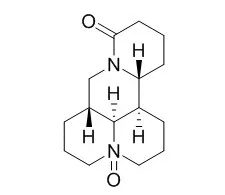| In vivo: |
| Planta Med. 2013 Jul;79(11):916-23. | | Anti-apoptotic and neuroprotective effects of oxysophoridine on cerebral ischemia both in vivo and in vitro.[Pubmed: 23807812] | In this study, we investigated the neuroprotective effect of Oxysophoridine on ischemia and ischemia-like insults.
METHODS AND RESULTS:
Protection by Oxysophoridine was studied at the in vivo level using a model of middle cerebral artery occlusion in mice and at the in vitro level using primary rat hippocampal neuronal cultures exposed to oxygen-glucose deprivation, a model of ischemia-like injury. The quantitative real-time PCR assay was used to evaluate the release of cytochrome c and the expression of caspase-3 mRNA. Oxysophoridine-treated groups (62.5, 125, 250 mg/kg) markedly reduced neurological deficit scores and infarct volumes. Treatment with Oxysophoridine (5, 20, 80 µmol/L) significantly attenuated neuronal damage, with evidence of decreased cell apoptosis and decreased cell morphologic impairment. Furthermore, treatment with Oxysophoridine could effectively downregulate the expression of cytochrome c and caspase-3 in both mRNA and protein levels, and Bax in the protein level, and induce an increase of Bcl-2 in the protein level. The caspase-3, -9, and -8 activities were also inhibited.
CONCLUSIONS:
These findings suggested that Oxysophoridine may be a potential neuroprotective agent for cerebral ischemia injury. | | Mol Med Rep. 2015 Jan;11(1):527-32. | | Oxysophoridine attenuates the injury caused by acute myocardial infarction in rats through anti-oxidative, anti-inflammatory and anti-apoptotic pathways.[Pubmed: 25338622] | Oxysophoridine (OSR), a natural alkaloid derived from the traditional Chinese medicinal plant sophora alopecuroides, can perform a variety of pharmacological actions. The aim of the present study was to assess the cardioprotective effect of Oxysophoridine against acute myocardial infarction (AMI) in rats.
METHODS AND RESULTS:
Oxysophoridine markedly reduced infarction size and levels of specific myocardial enzymes, including creatine kinase, the MB isoenzyme of creatine kinase, lactate dehydrogenase and cardiac troponin T. A reduced level of malondialdehyde was observed, and elevated catalase, Cu/Zn-superoxide dismutase (SOD), Mn-SOD, non-enzymatic scavenger glutathione and glutathione peroxidase activity were also identified in the Oxysophoridine-treated rats. Additionally, Oxysophoridine inhibited the activities of various inflammatory cytokines in a dose-dependent manner. These included nuclear factor-κB p65, tumor necrosis factor-α, and interleukin-1β, -6 and -10. Furthermore, Oxysophoridine treatment suppressed caspase-3 activity in a dose-dependent manner.
CONCLUSIONS:
These results demonstrate that Oxysophoridine ameliorates cardiac damage in a rat model of AMI and that this cardioprotection may be linked with its anti-oxidative, anti-apoptotic and anti-inflammatory properties. | | Neurochem Res. 2013 Nov;38(11):2408-17. | | Oxysophoridine protects against focal cerebral ischemic injury by inhibiting oxidative stress and apoptosis in mice.[Pubmed: 24078262] | Our previous studies have demonstrated that Oxysophoridine (OSR) has protective effects on cerebral neurons damage in vitro induced by oxygen and glucose deprivation.
METHODS AND RESULTS:
In this study, we further investigated whether Oxysophoridine could reduce ischemic cerebral injury in vivo and its possible mechanism. Male Institute of cancer research mice were intraperitoneally injected with Oxysophoridine (62.5, 125 and 250 mg/kg) for seven successive days, then subjected to brain ischemia induced by the model of middle cerebral artery occlusion. Oxysophoridine pretreatment groups significantly reduced infract volume and neurological deficit scores. Oxysophoridine decreased the percentage of apoptotic neurons, relieved neuronal morphological damage. Moreover, Oxysophoridine markedly decreased MDA content, and increased SOD, GSH-Px activities. Administration of Oxysophoridine (250 mg/kg) significantly suppressed overexpression of Caspase-3 and Bax, and increased Bcl-2 expression.
METHODS AND RESULTS:
These findings indicate that Oxysophoridine has a protective effect on focal cerebral ischemic injury through antioxidant and anti-apoptotic mechanisms. |
|






 Cell. 2018 Jan 11;172(1-2):249-261.e12. doi: 10.1016/j.cell.2017.12.019.IF=36.216(2019)
Cell. 2018 Jan 11;172(1-2):249-261.e12. doi: 10.1016/j.cell.2017.12.019.IF=36.216(2019) Cell Metab. 2020 Mar 3;31(3):534-548.e5. doi: 10.1016/j.cmet.2020.01.002.IF=22.415(2019)
Cell Metab. 2020 Mar 3;31(3):534-548.e5. doi: 10.1016/j.cmet.2020.01.002.IF=22.415(2019) Mol Cell. 2017 Nov 16;68(4):673-685.e6. doi: 10.1016/j.molcel.2017.10.022.IF=14.548(2019)
Mol Cell. 2017 Nov 16;68(4):673-685.e6. doi: 10.1016/j.molcel.2017.10.022.IF=14.548(2019)